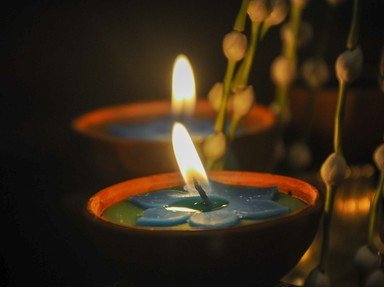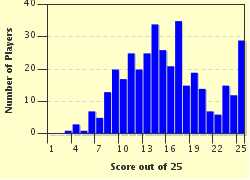Quiz Answer Key and Fun Facts
1. The Roman Catholic and Anglican versions of this prayer says "forgive us our trespasses," while most Protestant versions say "forgive us our debts."
2. What prayer contains the lines, "And you shall love the Lord your God with all your heart and with all your soul and with all your might"?
3. What famous prayer contains only the single line "Lord Jesus Christ, Son of God, have mercy upon me, a sinner"?
4. What prayer--or, more precisely, call to prayer--begins, "Allah is the Greatest, Allah is the Greatest, I assert that there is no God but Allah"?
5. What do evangelical Christians call the prayer that is typically prayed prior to conversion?
6. What Hindu prayer can be literally translated "May we attain that excellent glory of Savitar the god: So may he stimulate our prayers"?
7. Who is traditionally credited with authorship of the famous prayer that begins, "Lord, make me an instrument for your peace"?
8. A famous prayer of what religion contains the lines "I take refuge in my Gurus" and "I take refuge in the Dharma"?
9. Prior to delivering a sermon, many Christian priests and pastors pray, "May the words of my mouth and the meditation of my heart be pleasing in your sight, O LORD, my Rock and my Redeemer." Where is this prayer originally found?
10. What prayer, originally written by Reinhold Niebuhr, has been adopted by Alcoholics Anonymous?
11. Where did the beloved prayer that contains the lines "Yea, though I walk through the valley of the shadow of death, I will fear no evil" originate?
12. Most Jewish prayers of blessing begin with the words, "Blessed are You, Lord, our God, King of the ____." What is missing from the blank?
13. Who is traditionally credited with authorship of the famous prayer that begins, "Christ with me, Christ before me, Christ behind me, Christ in me, Christ beneath me, Christ above me"?
14. What famous Jewish prayer used in mourning rituals begins, "May his great Name grow exalted and sanctified in the world that he created as he willed"?
15. An anonymous but widely known Irish blessing begins "May the ___ rise to meet you, May the wind be always at your back." What is missing from the blank?
16. What man prayed, "Oh, that you would bless me indeed, and enlarge my territory" and thereby inspired a best-selling book in the year 2000?
17. What religion's prayer for peace contains the lines "Be a breath of life to the body of humankind, a dew to the soil of the human heart, and a fruit upon the tree of humility."
18. Where is the prayer that begins "Hear, Israel, the Lord is our God, the Lord is one" found?
19. A famous Hindu mantra begins, "From ignorance, lead me to truth. From darkness, lead me to ___." What is missing from the blank?
20. What is one of the earliest known Christian prayers to refer to the Trinity?
21. What prayer begins with the speaker saying he bows to prophets, liberated souls, spiritual leaders, teachers, and saints?
22. What is missing from the blank in this famous night-time prayer? "Now I lay me down to sleep. I pray the Lord my soul to ____."
23. "I give thanks before You, Living and Eternal King, that you have returned within me my soul with compassion; how abundant is your faithfulness!" When is this Jewish prayer recited?
24. Who famously prayed, "Lord, make me chaste, but not yet"?
25. "Inspirer of my mind, consoler of my heart, healer of my spirit, Thy presence lifteth me from earth to heaven, Thy words flow as the sacred river..." In which religion is this prayer recited daily?
Source: Author
skylarb
This quiz was reviewed by FunTrivia editor
CellarDoor before going online.
Any errors found in FunTrivia content are routinely corrected through our feedback system.


